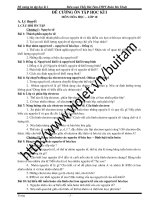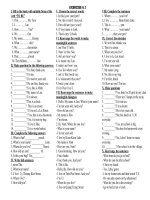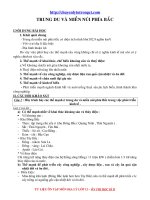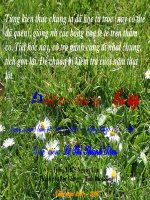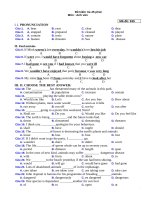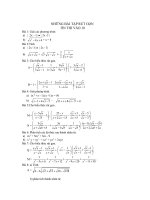BÀI ÔN TẬP LỚP 10 (1)
Bạn đang xem bản rút gọn của tài liệu. Xem và tải ngay bản đầy đủ của tài liệu tại đây (66.6 KB, 5 trang )
TEST YOURSELF
I. Choose the words that best answer the following questions.
1. Which of the following words is stressed on the first syllable ?
a. conserve b. organism c. interact d. erosion
2. Which of the following words is stressed on the second syllable ?
a. biovidersity b. national c. orphanage d. survival
3. Which of the following words has the final pronounced /id/ ?
a. eliminated b. established c. conserved d.
threatened
4. Which of the following words has the underlined part pronounced differently
from that of the others ?
a. pair b. rain c. afraid d. straight
5. Which of the following words has the letter p is silent ?
a. protect b. camping c. cupboard d. people
II. Choose the word or phrase - a, b, c or d - that best completes each
sentence or subtitutes for the underlined word or phrase.
6. New laws have been passed to _____ wildlife in this area.
a. establish b. conserve c. produce d.
endanger
7. They were seeking a solution to the _____ of the rain forests.
a. destroy b. destroying c. destroyer d.
destruction
8. Although he didn’t have a ticket, Ken _____ come in.
a. could b. can c. might d. was
allowed to
9. Nearly 1,000 of the world’s bird species are threatened with _____.
a. appearance b. protection c. extinction d.
destruction
10. We really ought to make a start on campaigns to _____ our polluted rivers
and seas.
a. clean up b. clear away c. wipe out d. tidy up
11. He came running _____ the room and threw his books _____ the floor.
a. into/ at b. in/ to c. to/ on d. into/
onto
12. Rare species of plants or _____ can be found in this region.
a. fauna b. flora c. flowers d.
vegetation
13. The hydroelectric plant provides electricity for half the island’s population.
a. using hydrogen to produce electricity
b. using radiating energy to produce electricity
c. using water power to produce electricity
d. using tidal power to produce electricity
14. The water is so contaminated that it is not suitable for drinking.
a. toxic b. salty c. dangerous d. polluted
15. Without plants, most water would _____ as soon as it falls.
a. run out b. run off c. run of d. run
away
III. Choose the correct answer - a, b, c or d - that best completes each
sentence.
16. If Al had come sooner, he _____ dinner with us.
a. could have eaten b. would being eaten c. was eating d. could
eat
17. “Are you still employed at the bank?” “Yes, I _____ there since 1982.”
a. have working b. worked
c. have been working d. had been working
18. Orlando, a city in Florida, _____ for its main attraction - Disney World.
a. which is well-known b. well-known
c. which well-known d. is well-known
19. “What’s wrong with your stereo?” “The needle needs _____.”
a. to replace b. replacing c. to be replace d. replace
20. All the students _____ do well in writing.
a. whom Mr. Davis teaches them b. which Mr. Davis teaches
c. that Mr. Davis teaches them d. Mr. Davis teaches
21. The world _____ a better place if we had known a hundred years ago what
we know today about the earth’s environment.
a. will be b. was c. should be d. might be
22. If water is heated to 212 degrees F _____ as steam.
a. it can boil and escape b. it is boiled and escaped
c. it boils and escapes d. it would boil and escape
23. _____ resigned, we would have been forced to sack him.
a. Had he not b. Hadn’t he c. He had not d. If he
had
24. _____ television to the exclusion of all other activities is not a healthy habit
for a growing child.
a. To be watched b. Being watched c. Watching d. Watch
25. It’s against the law to kill the black rhinoceros. They _____ extinct.
a. became b. have become c. become d. are
becoming
IV. Identify the one underlined word or phrase - A, B, C or D - that must be
changed for the sentence to be correct.
26. Scientists suggest that only one percent of the world’s extinct animals and
plants has
A B C D
identified.
D
27. Some underground water is enough safe to drink, but all surface water
must be treated.
A B C D
28. Because the expense of traditional fuels and the concern that they might
run out, many
A B C
countries have been investigating alternative sources of power.
D
29. Would you mind bringing your camera in the graduation party tomorrow ?
A B C D
30. Biochemists have solved many of the mysteries about phonosynthesis, the
process which
A B C
plants make food.
D
31. Many people who live near the ocean depend on it as a source of food,
recreation, and
A B C
to have economic opportunities.
D
32. Geothermal energy is energy to obtain by using heat from the Earth’s
interior.
A B C D
33. Most types of dolphins will live at least twenty-five years, and some
species may reach 50
A B C
years of age.
D
34. Isle Royale National Park in Lake Superior can only be reached by the
boat.
A B C D
35. Sharks can detect minute electrical discharges come from their preys.
A B C D
V. Choose the one option - a, b, c, or d - that best completes the
passage.
Yellowstone National Park, the first US national park, was (36) _____ in 1872.
It is one of the largest parks. It (37) _____ about 3,500 square (38) _____ or
9,065 square kilometers (39) _____ north-west Wyoming and parts of Idaho and
Montana. It has many wild animals, (40) _____ bears, buffalo, elk, deer,
antelope, coyotes, and lynxes, and is famous (41) _____ its fine scenery, hot
springs and (42) _____ (underground hot springs that shoot hot water or steam
up into the air). There are about seventy geysers in the park. The most famous is
Old Faithful.
The park is a (43) _____ tourist attraction. It has about three million (44)
_____ a year. It was (45) _____ a World Heritage Site in 1978.
36. a. started b. established c. constructed d.
introduced
37. a. contains b. involves c. covers d. spreads
38. a. lands b. feet c. distances d. miles
39. a. in b. of c. from d. at
40. a. containing b. including c. adding d.
consisting
41. a. to b. as c. with d. for
42. a. waterfalls b. torrents c. geysers d. chutes
43. a. interesting b. favorite c. fashionable d. popular
44. a. visitors b. foreigners c. migrants d. trippers
45. a. called b. opened c. made d. formed
VI. Choose the best answers.
Rainforests circle the globe for twenty degrees of latitude on both sides of the
equator. In that relatively narrow band of the planet, more than half of all the
species of plants and animals in the world make their home. Several hundred
different varieties of trees may grow in a single acre, and just one of those trees
may be the habitat for more than ten thousands kinds of spiders, ants, and other
insects. More species of amphibians, birds, insects, mammals, and reptiles live in
rainforests than anywhere else on earth.
Unfortunately, half of the world’s rainforests have already been destroyed, and
at the current rate, another 25 percent will be lost by the year 2000. Scientists
estimate that as many as fifty million acres are destroyed annually. In other
words, every sixty seconds, one hundred acres of rainforest is being cleared.
When this happens, constant rains erode the former forest floor, the thin layer of
soil no longer supports plant life, and the ecology of the region is altered forever.
Thousands of species of plants and animals are condemned to extinction and
since we aren’t able to predict the ramifications of this loss to a delicate global
ecology, we don’t know what we may be doing to the future of the human species
as well.
46. What is the point of view that the author expresses in this passage ?
a. The author believes that the rainforest will survive.
b. The author believes that preserving the rainforest is important to the
global ecology.
c. The author believes that he can predict the future of global ecology.
d. The author believes that the extinction of species is a natural precess.
47. According to the passage, more than half of all the species of plants and
animals _____.
a. live in twenty rainforests.
b. live in several hundred different varieties of trees.
c. live in a forty-degree band of latitude.
d. live in areas where the rainforest has been cleared.
48. How many of the world’s rainforests are projected to be destroyed by the
year 2000 if the current rate continues ?
a. All of them will be gone. b. Three-quarters of them will be
gone.
c. Half of them will be gone. d. One-quarter of them will be
gone.
49. The word ‘this’ in line 12 refers to _____.
a. the destruction of the acres. b. the reading of the passage.
c. the erosion of the forest floor. d. the constant rains.
50. What will not happen if the rainforest continues to be cleared ?
a. The land will be eroded by the rains.
b. Many species of plants and animals that depend on the rainforest will
become extinct.
c. The future of the human species may be changed.
d. The rainforest will grow, but at a much slower rate.
